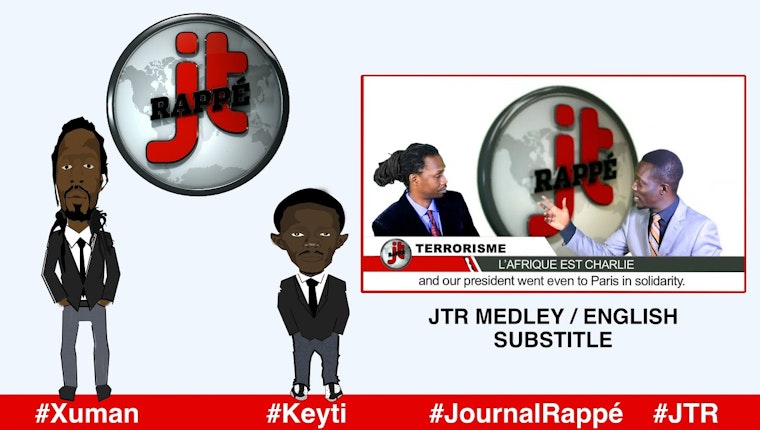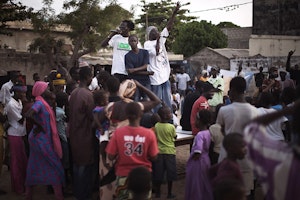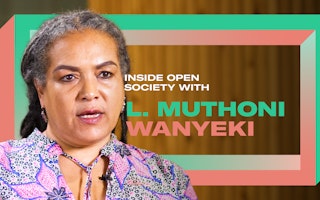Senegalese Rappers Set the News to a Beat, and Viewership Soars
By Amanda Fortier

You don’t normally think of rappers as news sources. But in Senegal two prominent rap artists, Xuman and Keyti, have been rapping the news in French, Wolof (Senegal’s dominant local language), and English for the last two years. Their YouTube series, known as JT Rappé, is watched by some 45,000 viewers every week online.
I spent a couple days with the lean and dreadlocked Xuman and the shorter, powerfully built Keyti, who have been friends for over 20 years and are widely known throughout the country not only as talented musicians, but also as social activists who aren’t afraid to challenge authority figures—including politicians and influential religious leaders.
Every JT Rappé episode starts with the same familiar greeting by Xuman, who clears his throat and deliberately stacks his notes before rattling off in French the standard JT introduction: “Welcome, get settled in, we have some news for you. Some good, some bad, but some news for you …” And the eight-minute news bulletin begins, a range of local, regional, and international stories, from the recent imprisonment of the former Senegalese president’s son to the Charlie Hebdo tragedy to xenophobic attacks in South Africa. Their relaxed and informal style stands in contrast to the serious subject matter.
As they assemble the episode, the two rappers are crouched together on the floor in a corner of their sound studio in Xuman’s house. They are quietly sharing notes and exchanging ideas for the upcoming episode. There are murmurs in Wolof and French, rhyming and rapping and bobbing of heads. The sound engineer, known as No Face, arrives to set up the beat to which that week’s lyrics will be set.
The rest of the afternoon is spent recording as both Xuman and Keyti take turns rapping their news segments, ensuring that sentences rhyme, words flow, and the content is informative and meaningful. It’s a task that requires incredible timing, precision, and patience. But it also takes research, creativity, and a keen sense of messaging. They strive to deliver news that is relevant and thought-provoking, that challenges, questions, and stimulates debate.
This episode is focused mainly on sex education among Senegal’s youth. It’s a sensitive topic in this 95-percent Muslim nation, where premarital sex and promiscuity are strongly discouraged. It’s also exactly the kind of topic JT Rappé seeks to address—it’s taboo, relevant, and youth-focused.
Young Senegalese are Xuman and Keyti’s primary audience. They’re the segment of society that often feels disempowered, voiceless, and frustrated with the state of their political, social, and economic environment. Rappers, as an artistic community in Senegal, enjoy unique status as the voice of the young masses. For the country’s under-35 population, it’s rappers—not the media—who are the true Fourth Estate.
This particular day of recording took over 12 hours, about 10 hours more than usual because the JT Rappé duo invited two teenage boys to “guest rap” on this episode. The second day took place at a three-bedroom apartment across town, where they film each episode. The set consists of two chairs, a table, and a makeshift green screen. The crew is nothing more than a cameraman and someone to hold the iPad teleprompter.
Xuman and Keyti, both dressed in ironically formal attire, record their separate film segments with their pre-recorded voices from the day prior streaming from the MacBook on the floor. Eschewing the staunch formality typical of news presenters, Xuman and Keyti deliver their reports with theatrical antics, humor, and satire, which means you don’t necessarily need to understand the language to enjoy the show.
After spending a day observing the weekly JT Rappé episode being produced, it’s clear that beneath the beats and the antics there’s a deeply substantive body of work being produced. Xuman and Keyti have pioneered a channel for youth engagement in current news affairs in a masterful way—the number of YouTube hits they get speaks for itself.
But they’ve also extended their influence beyond the youth population, and even beyond Senegal, appealing to a multitude of ages and nationalities across West Africa. Recently, the rapped journal concept reached nearby Cote d’Ivoire, where two prominent Ivorian rappers, Smile and Nash, are now bringing news and rap together in that country, opening new minds and fostering new debates. And that, quite frankly, is good news for us all.
JT Rappé is supported by the Open Society Foundations.
Until October 2015, Amanda Fortier was a communications officer for the Open Society Initiative for West Africa.


